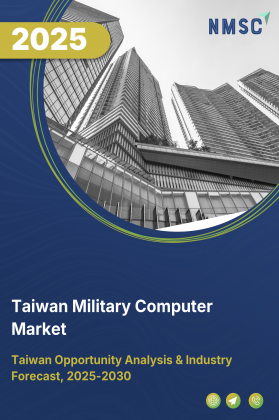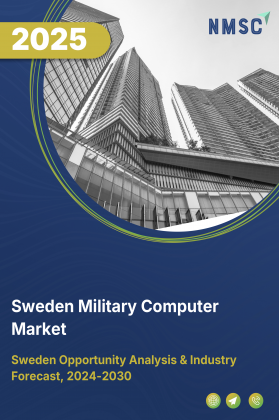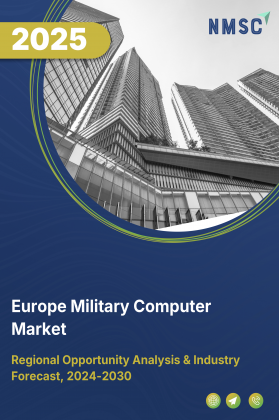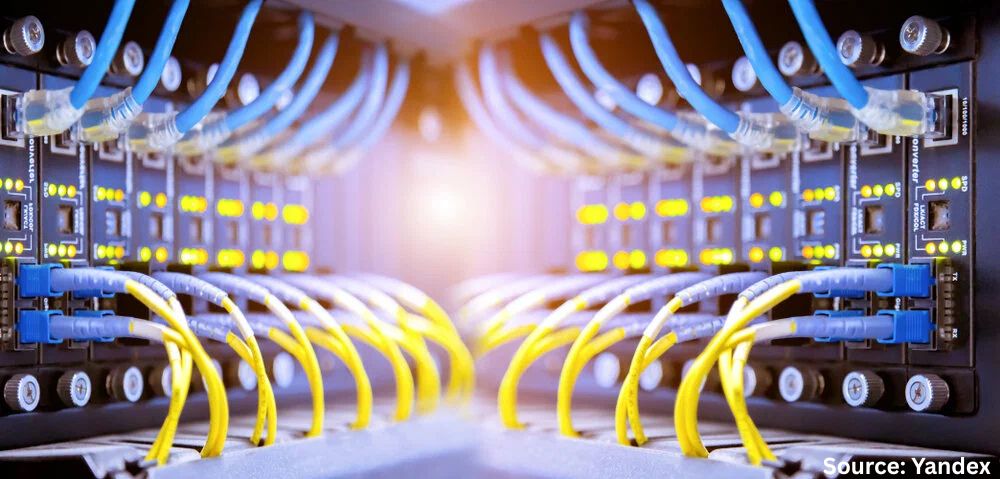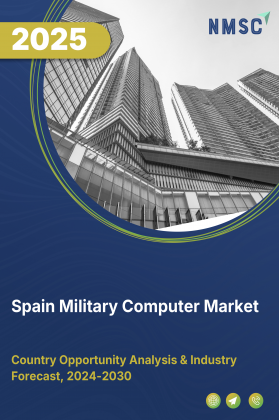
Spain Military Computer Market by Component (Hardware, Software, and Service), by Product (Rugged Computer, Embedded Computer, and Wearable Computer), by Application (Command and Control Systems, Communication Systems, Combat and Tactical Operations, Intelligence, Surveillance, and Reconnaissance (ISR) Systems, and Others), and by End-User (Army, Navy, and Air Force) – Opportunity Analysis and Industry Forecast, 2025–2030
Industry: Aerospace & Defense | Publish Date: 05-Nov-2025 | No of Pages: 120 | No. of Tables: 87 | No. of Figures: 52 | Format: PDF | Report Code : AD3658
Industry Outlook
The Spain Military Computer Market size was valued at USD 162.7 million in 2024, and is projected to grow to USD 186.68 million by 2025. Additionally, the industry is expected to continue its growth trajectory, reaching USD 310.9 million by 2030, at a CAGR of 10.7% from 2025 to 2030.
The factors such as Spain’s increasing military expenditure and emergence as a leading global arms exporter drives market growth. However, the high cost of military computing systems poses significant challenges to market expansion. On the contrary, the implementation of artificial technologies offers promising future opportunities to enhance operational efficiency and decision-making capabilities. Moreover, the top players such as Microchip Technology Inc. and Panasonic Corporation are taking various initiatives in order to enhance their market position and expand their product offerings. These initiatives are expected to drive innovation and adoption in the military computer market, improving the overall effectiveness and readiness of defense forces. With advancements in AI and ML, companies are focusing on developing reliable communication and autonomous systems, offering enhanced security, privacy, and user control. As the market matures, the increasing demand for enhanced operational efficiency and decision-making capabilities is expected to fuel further growth.
Increasing Military Expenditure Driving Military Computer Market Growth
The increase in military expenditures in the country drives the adoption of advanced computing systems aimed at strengthening operational efficiency. There is a direct correlation with the ability to invest in high-performance technologies essential for real-time mission management and data analysis as defense budget rises. Spain significantly increase its military allocation to 9.8% in 2023, as compared to the previous year by investing USD 23.7 billion, accounting for 1.5% of the country's GDP. This rise in defense funding sparked a surge in demand for to improve operational efficiency and readiness using military computers. Consequently, this rise in defense funding facilitates the deployment of high-performance technologies that drives the military computer market in the country.
Rise of Global Arms Export Driving Market Expansion
The rise of global arms export in the country fuels the demand for advanced computing solutions to support its defense equipment. According to SIPRI 2024, Spain ranked among the top ten global arms exporters during 2019–2023, contributing approximately 2.7% to the global export share. This prominence in the international arms trade underscores the importance of integrating sophisticated military computers to ensure the compatibility and operational efficiency of exported defense systems. The increasing focus on modernization and global defense collaboration is bolstering the adoption of advanced military computers within Spain.
High Cost of Military Computing Systems Restrains the Spain Military Computer Market Expansion
The high cost of advanced military computing systems presents a significant challenge, especially for smaller defense contractors and organizations with limited budgets. Their ability to adopt and integrate cutting-edge military computing technologies is severely restricted, hindering their capacity to enhance operational efficiency and improve strategic decision-making. The high initial and maintenance costs not only affects the smaller organizations but also delays the modernization of the overall defense sector in the country, slowing the growth of military computer in Spain.
Integration of Artificial Intelligence and Machine Learning Technology Creates Future Market Opportunities
The integration of advanced technologies, such as artificial intelligence (AI) and machine learning (ML) creates possibility for military computer market growth. The integration of AI and ML becomes essential as these technologies enhance operational efficiency and decision-making capabilities. Military computers with the ability to support autonomous systems, such as drones and unmanned vehicles, ensure secure, reliable communication between them and are opening up new opportunities for innovation in the defense sector. As defense budgets continue to rise and the need for advanced technologies increases, the integration of AI and ML in military computers is expected to drive significant growth in the Spain military computer market trends.
Competitive Landscape
Several key players operating in the Spain military computer industry are Microchip Technology Inc., Panasonic Corporation, Qualcomm Technologies, Inc., Thales Group, MPL AG, Palantir Technologies Inc., IBM Corporation, Mitsubishi Electric Corporation, General Dynamics Corporation, Lockheed Martin Corporation and others.
Spain Military Computer Market Key Segments
By Component
-
Hardware
-
Processors
-
Input/Output Devices
-
Others
-
-
Software
-
Operating Systems
-
Application Software
-
-
Service
By Product
-
Rugged Computer
-
Rugged Laptops
-
Rugged Tablets
-
Rugged Displays
-
Rugged Handhelds
-
-
Embedded Computers
-
Wearable Computers
By Application
-
Command and Control Systems
-
Communication Systems
-
Combat and Tactical Operations
-
Intelligence, Surveillance, and Reconnaissance (ISR) Systems
-
Others
By End User
-
Army
-
Navy
-
Air Force
Key Players
-
Microchip Technology Inc.
-
Qualcomm Technologies, Inc.
-
Thales Group
-
MPL AG
-
Palantir Technologies Inc.
-
Mitsubishi Electric Corporation
-
General Dynamics Corporation
-
Lockheed Martin Corporation
Report Scope and Segmentation
|
Parameters |
Details |
|
Market Size in 2025 |
USD 186.68 Million |
|
Revenue Forecast in 2030 |
USD 310.9 Million |
|
Growth Rate |
CAGR of 10.7% from 2025 to 2030 |
|
Analysis Period |
2024–2030 |
|
Base Year Considered |
2024 |
|
Forecast Period |
2025–2030 |
|
Market Size Estimation |
Million (USD) |
|
Growth Factors |
|
|
Companies Profiled |
10 |
|
Market Share |
Available for 10 companies |
|
Customization Scope |
Free customization (equivalent up to 80 working hours of analysts) after purchase. Addition or alteration to country, regional, and segment scope. |
|
Pricing and Purchase Options |
Avail customized purchase options to meet your exact research needs. |

















 Speak to Our Analyst
Speak to Our Analyst



